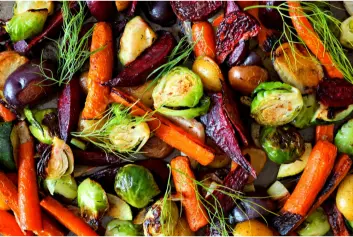It's Almost March - Are You Ready?
March is Colon Cancer Awareness Month, a time dedicated to raising awareness about the importance of early detection and prevention strategies for colon cancer.
Throughout this month, various organizations, healthcare professionals, and communities come together to educate the public about the risk factors, symptoms, and screening options available for this prevalent disease.
By spreading awareness and encouraging individuals to prioritize their health through regular screenings and lifestyle modifications, Colon Cancer Awareness Month plays a crucial role in saving lives and reducing the burden of colon cancer worldwide.
Early detection of Colon Cancer Saves Lives
In the realm of healthcare, prevention and early detection often take precedence in the fight against various diseases. Among these, colon cancer stands as a formidable adversary, claiming thousands of lives each year. However, with advancements in medical science and proactive measures like screening guidelines and colonoscopies, the narrative is changing. Understanding the importance of early detection in combating colon cancer is paramount.
Colon cancer, also known as colorectal cancer, typically develops from precancerous polyps in the colon or rectum. These polyps can grow undetected for years before evolving into cancer. However, with regular screenings, these polyps can be identified and removed, significantly reducing the risk of cancer development.
One of the most effective screening methods for colon cancer is the colonoscopy. While the thought of a colonoscopy may evoke apprehension in some individuals, its benefits far outweigh any temporary discomfort. During a colonoscopy, a doctor examines the inner lining of the colon using a flexible tube with a camera attached. This procedure allows for the detection and removal of polyps before they become cancerous.
Understanding colon cancer screening guidelines is crucial for individuals of certain age groups or with specific risk factors. Generally, screening for colon cancer should commence at age 45 for average-risk individuals, according to recent recommendations. However, those with a family history of colon cancer or other risk factors may need to begin screening earlier and undergo screenings more frequently.
Early detection through regular screenings not only improves the chances of successful treatment but also reduces mortality rates associated with colon cancer. By detecting cancer in its early stages, treatment options are often less invasive and more effective. Additionally, identifying and removing polyps during a colonoscopy can prevent the development of cancer altogether.
Moreover, raising awareness about the importance of colon cancer screenings is vital in encouraging individuals to prioritize their health. Dispelling myths and misconceptions surrounding colonoscopies and discussing the potentially life-saving benefits can motivate more people to undergo screening.
Understanding the significance of early detection in colon cancer through screening guidelines and colonoscopies is paramount. By staying informed, following recommended screening protocols, and advocating for regular screenings, individuals can take proactive steps towards reducing their risk of colon cancer and ultimately saving lives. Remember, early detection saves lives – it’s time to take charge of your health and prioritize preventive care.
Nutrition Tips for Winter Keeping Warm and Nourished

As the chilly winds of winter sweep in, our bodies naturally crave heartier, warmer foods to keep us cozy and nourished. While it’s tempting to indulge in comfort foods, maintaining a balanced diet is crucial for overall health, especially during the colder months. Here are some nutrition tips to help you stay on track and thrive this winter season.
Seasonal Fruits and Vegetables:
Embrace the bounty of winter produce to add variety and nutrition to your meals. Despite the colder weather, there are plenty of seasonal fruits and vegetables to enjoy. Citrus fruits like oranges, grapefruits, and clementines are rich in vitamin C, which can help boost your immune system and ward off winter colds. Root vegetables such as carrots, sweet potatoes, and parsnips are not only hearty and satisfying but also packed with essential nutrients like fiber, vitamins, and antioxidants. Incorporating these seasonal gems into your meals ensures you’re getting a dose of vitamins and minerals to support your overall health.
Hearty Soups:
Nothing beats a warm bowl of soup on a cold winter’s day. Soups are not only comforting but also a fantastic way to pack in nutrients from various ingredients. Whether you prefer a classic vegetable soup, a creamy squash soup, or a hearty lentil stew, soups can be customized to suit your taste and dietary preferences. Opt for homemade soups whenever possible, as they allow you to control the ingredients and avoid excessive sodium and additives commonly found in store-bought varieties. Adding beans, lentils, or lean proteins like chicken or tofu to your soups boosts their nutritional content and makes them more satisfying.
Warm Beverages for Digestive Health:
Warm beverages can provide comfort and support digestive health during the winter months. Herbal teas such as ginger, peppermint, and chamomile are not only soothing but also aid in digestion and alleviate bloating or discomfort. Ginger tea, in particular, is known for its anti-inflammatory properties and can help alleviate nausea and indigestion. Additionally, warm water with lemon in the morning can kickstart your metabolism and promote hydration, which is essential even in colder weather. Avoid excessive consumption of sugary or caffeinated beverages, as they can dehydrate your body and disrupt your digestion.
Maintaining a balanced diet during the winter is essential for staying healthy and energized. By incorporating seasonal fruits and vegetables, hearty soups, and warm beverages into your daily routine, you can nourish your body and support your digestive health. Remember to listen to your body’s cravings, but also strive for variety and moderation in your food choices. With these nutrition tips, you’ll be well-equipped to thrive throughout the winter season and beyond.
Managing Acid Reflux in Cold Weather

As temperatures drop and snow blankets the landscape, many of us revel in the cozy comforts of winter. However, for those dealing with acid reflux, the cold weather can bring unwelcome challenges. Cold air, coupled with comfort food indulgences, can exacerbate symptoms like heartburn and regurgitation. But fear not! With a few simple strategies, you can keep acid reflux at bay and enjoy the winter wonderland to its fullest.
Mindful Eating: Be mindful of your diet, especially during festive gatherings where tempting treats abound. Spicy foods, citrus fruits, and fatty dishes can trigger reflux symptoms. Opt for lighter, non-acidic options and practice moderation to prevent discomfort.
Post-Meal Habits: After indulging in a hearty winter meal, resist the urge to hibernate immediately. Instead, stay upright for at least two to three hours to allow gravity to aid digestion and prevent stomach acid from creeping up into the esophagus.
Elevate Your Sleep: Elevating the head of your bed by six to eight inches can help keep acid in the stomach where it belongs. Invest in a wedge pillow or use risers to lift the head of your bed, promoting better sleep and reducing nighttime reflux episodes.
Stay Hydrated: While hot cocoa and mulled cider may be tempting, opt for water as your primary beverage. Avoid excessive consumption of caffeine and alcohol, both of which can relax the lower esophageal sphincter, leading to increased reflux symptoms.
Bundle Up: Cold air can exacerbate reflux symptoms by causing the muscles surrounding the esophagus to constrict. Bundle up when venturing outdoors to keep warm and minimize exposure to chilly temperatures.
By incorporating these simple strategies into your winter routine, you can effectively manage acid reflux symptoms and fully embrace the magic of the season. Remember, a little extra care and attention to your lifestyle choices can go a long way toward ensuring your winter months are filled with comfort and joy, free from the discomfort of acid reflux.
Ensuring Safe Meals A Guide to Preventing Foodborne Illnesses

Foodborne illnesses, commonly known as food poisoning, can turn a delightful meal into a miserable experience. However, by following proper food handling practices, you can significantly reduce the risk of such infections and ensure the safety of your meals.
Here are some essential tips to keep in mind:
1. Wash Hands Thoroughly: Before handling any food, make sure to wash your hands with soap and water for at least 20 seconds. This simple step can prevent the transfer of harmful bacteria to your food.
2. Clean Surfaces and Utensils: Keep kitchen surfaces, cutting boards, and utensils clean by washing them with hot, soapy water after each use. Sanitize them regularly, especially after preparing raw meat, poultry, or seafood.
3. Separate Raw and Cooked Foods: Prevent cross-contamination by keeping raw meat, poultry, seafood, and eggs separate from ready-to-eat foods. Use separate cutting boards and utensils for raw and cooked items.
4. Cook Foods to Safe Temperatures: Use a food thermometer to ensure that meats, poultry, seafood, and eggs are cooked to their recommended internal temperatures. Cooking at high temperatures kills harmful bacteria, reducing the risk of foodborne illnesses.
5. Chill Perishable Foods Promptly: Refrigerate perishable foods, including leftovers and takeout, within two hours of cooking or purchasing. Keep your refrigerator temperature at 40°F (4°C) or below to slow the growth of bacteria.
6. Avoid Cross-Contamination: Use separate utensils and plates for raw and cooked foods to prevent the transfer of bacteria. Never reuse marinades or sauces that have come into contact with raw meat, poultry, or seafood.
7. Practice Safe Thawing: Thaw frozen foods in the refrigerator, under cold running water, or in the microwave. Avoid thawing foods on the counter, as it allows bacteria to multiply rapidly.
8. Be Mindful of Expiry Dates: Check the expiration dates on packaged foods and discard any items that are past their prime. Consuming expired foods increases the risk of foodborne illnesses.
9. Stay Hydrated: Drinking plenty of water helps flush toxins from your system and can alleviate symptoms if you do experience food poisoning.
10. Trust Your Senses: When in doubt, trust your instincts. If a food looks, smells, or tastes off, it’s better to err on the side of caution and discard it.
By following these simple guidelines, you can minimize the risk of foodborne illnesses and enjoy safe, delicious meals with peace of mind. Remember, practicing proper food safety is essential for protecting yourself and your loved ones from the dangers of foodborne pathogens. Stay vigilant, stay safe, and savor every bite!


